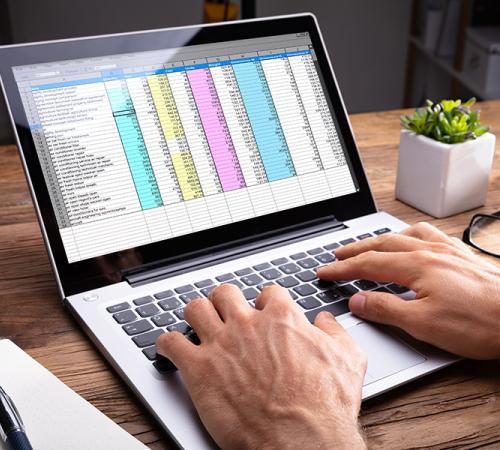

There are many decisions you need to make when you first start your journey as a freelancer.
Once you’ve decided what you want to do, who your ideal customer is, how you’re going to do it and what will make you stand out, you need to deal with one of the most essential yet scariest parts – dealing with your finances, tax and accounts (and therefore accountants).
But choosing the right accountant is a difficult decision. To get a sense of the rights questions you should ask, I spoke to tax-return coach and micro-business owner Rosie Slosek, who specialises in UK freelancers.
Below, Rosie outlines what you should ask accountants, what you should ask yourself and what are the biggest challenges freelancers face, as well as suggestions on how to be more confident about dealing with your tax return and accounts.
Q: What questions do you think freelancers should ask themselves before they approach an accountant?
Firstly, what kind of accountant do you want. Or rather, what kind of client are you? Do you want to have lots of input and involvement, with full understanding of the process, or would you prefer to leave it up to them entirely to wave a magic wand?
Think about what kind of business you have too. For example, if you have a business selling digital products like eBooks and eCourses, it’s important that you find an accountant that has a good understanding of the industry and the challenges you face. If you’re planning to mainly take on contracts, you need an accountant who understands IR35s.
Do you want to be a limited company or a sole trader? As with insurance, it’s important when weighing up whether to go sole trader or limited company what the risk is by doing risk analysis.
Also, do you even need an accountant at this point? Many freelancers are able to do their tax return themselves for the first couple of years, which can keep overheads down. If you become a limited company, you need an accountant as its pretty impossible to do it all yourself.
When it comes to a budget, base this on the shortlist of accountants you come up with after considering the above. How much can you afford? Don’t forget, cheaper doesn’t always mean cheaper as investing a bit more can mean you save yourself time, sanity or even, tax.
What questions do you wish freelancers asked their accountants?
Imagine you’re dating and you have a shortlist of what you want. Finding an accountant works in a similar way.
Do you want someone that understands digital businesses or your industry? Perhaps someone who has a good understanding of your industry? Finding an accountant is like finding professional indemnity insurance – it needs to fit your needs!
Are they asking YOU the right questions? If they have no interest in talking about your business and what you do, this should ring some alarm bells.
Are they okat with you using accounting software? If an accountant either doesn’t recognise the name of the software you use if it’s one of the common packages, or discourages you using it because they prefer you use what works better for them, this could cause problems later on if you want to use your software to send information to your accountant. It’s not about this being bad, more that it may not be a good fit for you.
Do you do the bookkeeping? This isn’t a good or bad thing, but it’s down to personal preference. Many accountants outsource their bookkeeping or tax returns and accounts at busy times, which isn’t a problem, but if you’d rather your accountant did it – ask!
What are the most common questions you get from freelancers?
A lot of freelancers are really nervous of the whole process and want to change their mindset from scared to savvy. This is mainly down to knowledge, and I help boost their confidence in business and freelancing by boosting their knowledge so they understand what their accountant does.
I want to help them create a routine that at least makes the process of doing admin enjoyable, whether it’s doing it with a side of tea and cake or by using unicorn stationery to get it done.
Essentially they’re scared about what they don’t know – and also what is relevant to them as there’s so much information out there.
What are the biggest challenges for freelancers at the moment?
The EU VAT situation is a big challenge at the moment for anyone dealing with digital products like eBooks, eCourses and online services. Even if you’re below the VAT threshold, if you sell anything automated online outside the UK from January, even by accident, you’ll have to register for VAT for all of your business – even if it’s just a £1 eBook.
Finally, the UK is one of the easiest places in the world to have a business. Take advantage of that, and learn as much as you can so you’re well-informed. The scariest part is the emotional block of being scared to learn, PI insurance protects you against a lot of that too.
Rosie Slosek lives in north London with her partner and an allotment. She runs One Man Band Accounting (external link), which offers tax return support, limited company support, and coaching (savings, bookkeeping, expenses, cash flow, late payments) – with a big side order of cake and support.
If your freelance career is getting underway, ensure that nothing gets in your way. Hiscox self-employeed and freelance insurance will provide the protect you need to keep things on track.
Guest bloggers may post on this site. The views, opinions and positions expressed within these guest posts are those of the author alone and do not represent those of Hiscox or its employees. The accuracy, completeness and validity of any statements made within these guest blogs are not guaranteed and we accept no liability for any errors, omissions or representations or any liability regarding infringement of intellectual property rights. Our social media house rules which also include details on how to contact us about any concerns you have regarding our social media channels, can be found here.
Disclaimer:
At Hiscox, we want to help your small business thrive. Our blog has many articles you may find relevant and useful as your business grows. But these articles aren’t professional advice. So, to find out more on a subject we cover here, please seek professional assistance.






